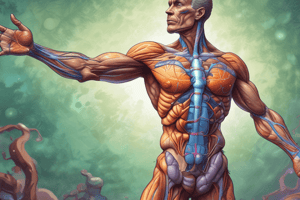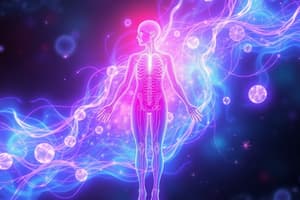Podcast
Questions and Answers
What is the primary role of receptors in hormone action?
What is the primary role of receptors in hormone action?
- To act as inhibitors for hormone interactions.
- To produce hormones in the cytoplasm.
- To directly transport hormones into the cell.
- To maintain homeostasis by responding to specific hormones. (correct)
Which of the following hormones primarily uses the mobile receptor mechanism for its action?
Which of the following hormones primarily uses the mobile receptor mechanism for its action?
- Cortisol (correct)
- Growth hormone
- Antidiuretic hormone (ADH)
- Oxytocin
Which statement accurately describes the fixed membrane receptor mechanism?
Which statement accurately describes the fixed membrane receptor mechanism?
- It allows hormones to freely diffuse through the plasma membrane.
- It predominantly functions with lipid-soluble hormones.
- It involves hormone-receptor complexes entering the nucleus.
- It utilizes cyclic AMP as a secondary messenger after hormone binding. (correct)
What occurs when a water-soluble hormone binds to its receptor?
What occurs when a water-soluble hormone binds to its receptor?
What is the consequence of cyclic AMP (cAMP) activation within a target cell?
What is the consequence of cyclic AMP (cAMP) activation within a target cell?
Which hormone mechanism primarily regulates gene expression?
Which hormone mechanism primarily regulates gene expression?
What happens to cyclic AMP after it has acted in a target cell?
What happens to cyclic AMP after it has acted in a target cell?
How do amino acid derivative hormones typically function within cells?
How do amino acid derivative hormones typically function within cells?
Flashcards
Hormone Action: Homeostasis
Hormone Action: Homeostasis
Hormones maintain the body's internal balance, a state called homeostasis.
Hormone Receptors
Hormone Receptors
Receptors are specific proteins that bind with hormones, acting like locks and keys.
Receptor Sensitivity
Receptor Sensitivity
The sensitivity and responsiveness of a receptor depend on the number of receptors and their affinity for the hormone.
Receptor Location
Receptor Location
Signup and view all the flashcards
Fixed Membrane Receptor Mechanism
Fixed Membrane Receptor Mechanism
Signup and view all the flashcards
Mobile Receptor Mechanism
Mobile Receptor Mechanism
Signup and view all the flashcards
Hormone-Receptor Complex: Gene Expression
Hormone-Receptor Complex: Gene Expression
Signup and view all the flashcards
Hormone Action Mechanisms: Two Types
Hormone Action Mechanisms: Two Types
Signup and view all the flashcards
Study Notes
Hormone Action
- Hormones maintain homeostasis in the body.
- Hormone receptors are specific to each hormone.
- Receptor sensitivity depends on receptor number and affinity.
- Receptor location varies: cell membrane (e.g., protein hormones, catecholamines), cytoplasm (e.g., steroid hormones), or nucleus (e.g., thyroxine).
- Hormone types include peptides, polypeptides, proteins, steroids, iodothyronines (thyroid hormones), and amino acid derivatives.
- Membrane-bound receptor hormones don't enter cells; they trigger second messengers to change cell metabolism.
- Intracellular receptor hormones regulate gene expression or chromosome function by interacting with the genome.
Mechanism of Hormone Action
- Two main mechanisms:
- Fixed membrane receptor mechanism
- Mobile receptor mechanism
Fixed Membrane Receptor Mechanism
- Water-soluble hormones (amines, proteins) use this mechanism.
- These hormones can't pass through the lipid cell membrane.
- They bind to cell membrane receptors.
- Binding activates adenyl cyclase, producing cAMP (cyclic AMP).
- cAMP acts as a secondary messenger, activating enzymes to alter biochemistry.
- Phosphodiesterase deactivates cAMP.
Mobile Receptor Mechanism
- Lipid-soluble hormones (e.g., fatty acids, steroids) use this mechanism.
- These hormones can easily pass through the plasma membrane.
- They bind to intracellular receptors.
- This hormone-receptor complex activates enzymatic activity, initiating changes.
- The hormone-receptor complex initiates DNA transcription.
- mRNA is translated into proteins causing cellular biochemical changes.
Studying That Suits You
Use AI to generate personalized quizzes and flashcards to suit your learning preferences.





